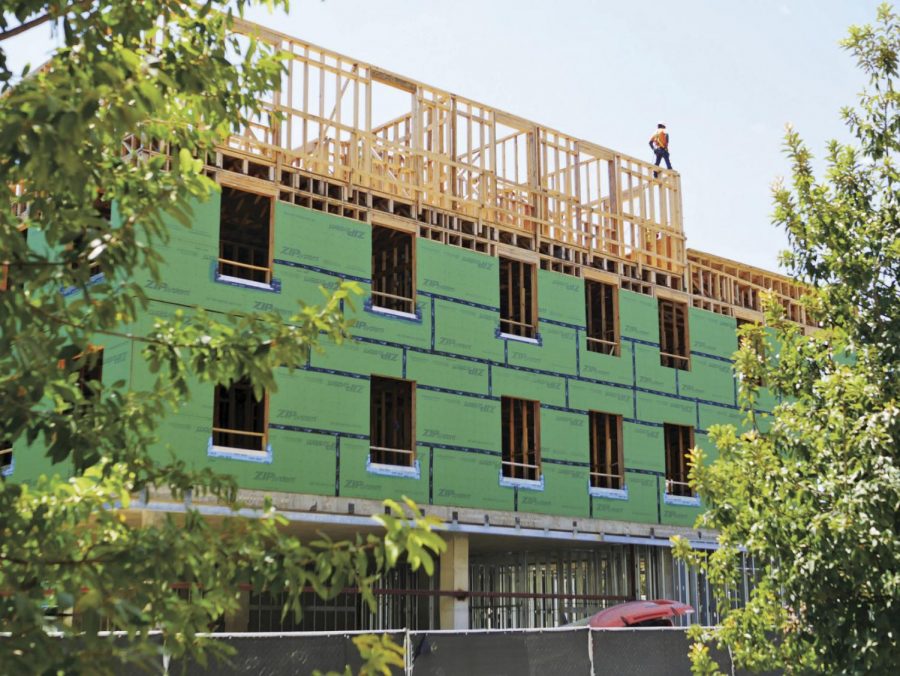State legislation leads to labor shortages, Pavilions construction delay
The 85th Texas Legislature saw many contentious bills that drew national attention upon the Lone Star State. While some legislative outcomes seemingly go unnoticed, one bill in particular served as a contributing factor in the construction delays for the Pavillions.
“The most significant challenge this project has had is a labor shortage, which as we know is a problem in the Austin area and it certainly did impact this project,” St. Edward’s University Director of Communications Mischelle Diaz said to KXAN in the days following the university’s announcement that the new residence hall would not be ready for the fall semester.
Across the state, there has been a rise in labor shortages, and a legislative action that correlates with these statistics is the passage of Senate Bill 4, which was proudly signed into law by Gov. Greg Abbott on May 7.
This bill encompasses many aspects of law and immigration enforcement, in which “sanctuary cities” are banned, and police officers are allowed to inquire about immigration status for those who are lawfully detained or arrested, which led to critics calling this a “Show Me Your Papers” bill.
However, immigration advocates and Democrats argue this bill will lead to racial profiling, and will negatively impact the economy due to labor shortages attributed by fear of deportation.
“If you are not someone who has committed a crime, you have absolutely nothing to worry about,” Abbott said to the Texas Tribune May 16. “There are laws against racial profiling, and those laws will be strictly enforced.”
However, the Houston Chronicle reported that a study found an estimated 400,000 construction workers in Texas reside in the state illegally. In addition, the U.S. Hispanic Contractors Association sent a letter to Abbott on Feb. 24 informing him that immigrants have aired on the side of caution when showing up for work in Austin after increased activity from Immigration and Customs Enforcement.
Two days before S.B. 4 would have gone into effect, it was temporarily blocked by a federal judge on Aug. 30 amid lawsuit claims that the policy is unconstitutional, and that Harvey victims were not seeking medical aid or rescue assistance out of fear of being asked to prove immigration status. Texas Attorney General Ken Paxton is filing to overrule the lower court’s ruling.
Nonetheless, construction projects all over the state are being prolonged, which is expected to continue when rebuilding efforts begin in the cities along the Texas Gulf Coast destroyed by rain and floods from Hurricane Harvey.
“[Harvey] will make the labor shortage we’ve had here a lot worse, at least in the months to come and into the first quarter of next year,” Phil Crone of the Dallas Builders Association said to NBC Dallas-Fort Worth on Sept. 12.
As for the Pavillions on campus, Diaz said to KXAN that the delay was also partially due to multiple other factors, such as weather and permitting. In July, St. Edward’s officials knew for certain that the residence hall would not be ready to house more than 400 students, the university began the task of arranging temporary housing at nearby apartments.
Students have been relocated to The Marriot, Omni, Residence Inn, and Staybridge Suites. These students are also provided with free transportation through Chariot, a ride sharing app.
Ten members of the men’s and women’s cross-country teams live in these apartments, along with multiple students who now have to adjust to living as a commuter student.
“Living in the hotel has made me wake up earlier for practice, and some of my teammates and I just carpool to get there quicker,” junior runner Stephan Parra Robles said.
From a complex piece of legislation, to labor shortages, to a pending lawsuit, a controversially complex piece of state legislation from the Texas State Capitol has made waves on a private liberal arts university down the road.







